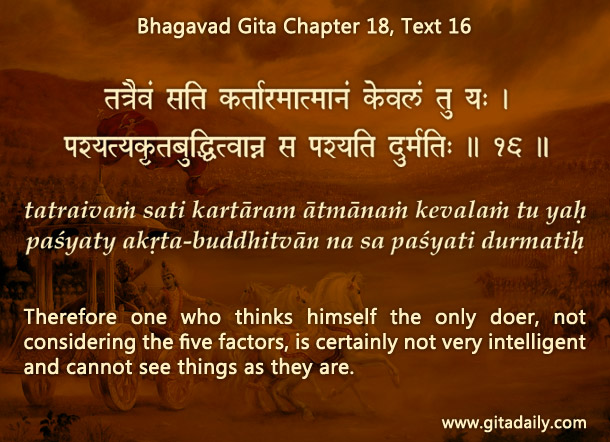In one of his oft-quoted statements, (03.27), Krishna tells Arjuna that the deluded think they are the doers of things that are actually done by the modes. Yet the very purpose of Krishna in speaking the Gita is to persuade Arjuna to do something: his duty of fighting. In fact, Krishna concludes his message by urging Arjuna to let due deliberation precede his decision (18.63). That he places the onus on Arjuna to decide suggests that he doesn’t consider Arjuna to be entirely a non-doer.
Through these statements, what is Krishna saying: are we non-doers or are we doers? To understand, consider Krishna’s analysis of the five factors that lead from action to result. These five factors are: the field of action, the doer, the senses, endeavor and destiny (18.14).
To understand these factors, consider a cricket metaphor. When a batsman produces a match-winning performance, what all factors are involved? The field of action is the pitch; the doer is the cricketer; the senses are the relevant sensory organs and their corresponding abilities: eyes, hands and legs, for example; the endeavor is the cricketer’s practice and commitment; and destiny refers to the many uncontrollable, even unknown, elements that shape the results — factors that cricketers may refer to as form, fortune and so forth. Only when all these five factors align together favorably can the batsman lead their team to victory.
Through this five-factor analysis, Krishna conveys that Arjuna alone won’t be determining the fate of those on the battlefield. If he thinks he is the sole doer, he is deluded (18.16). Instead, he can see fighting as his assigned role in Krishna’s plan for the world — a role that gels well with both his personal disposition and his social position as a kshatriya.
One-sentence summary:
We are neither the sole doers nor complete non-doers; we are one among several factors that contribute to the result — our role is contributive, not decisive.
Think it over:
- What are Krishna’s statements about doership that need to be reconciled?
- Explain the five factors of action using a metaphor.
- How does the five-factor analysis resolve the paradox about doership?
***
18.16: Therefore one who thinks himself the only doer, not considering the five factors, is certainly not very intelligent and cannot see things as they are.
To know more about this verse, please click on the image


Leave A Comment